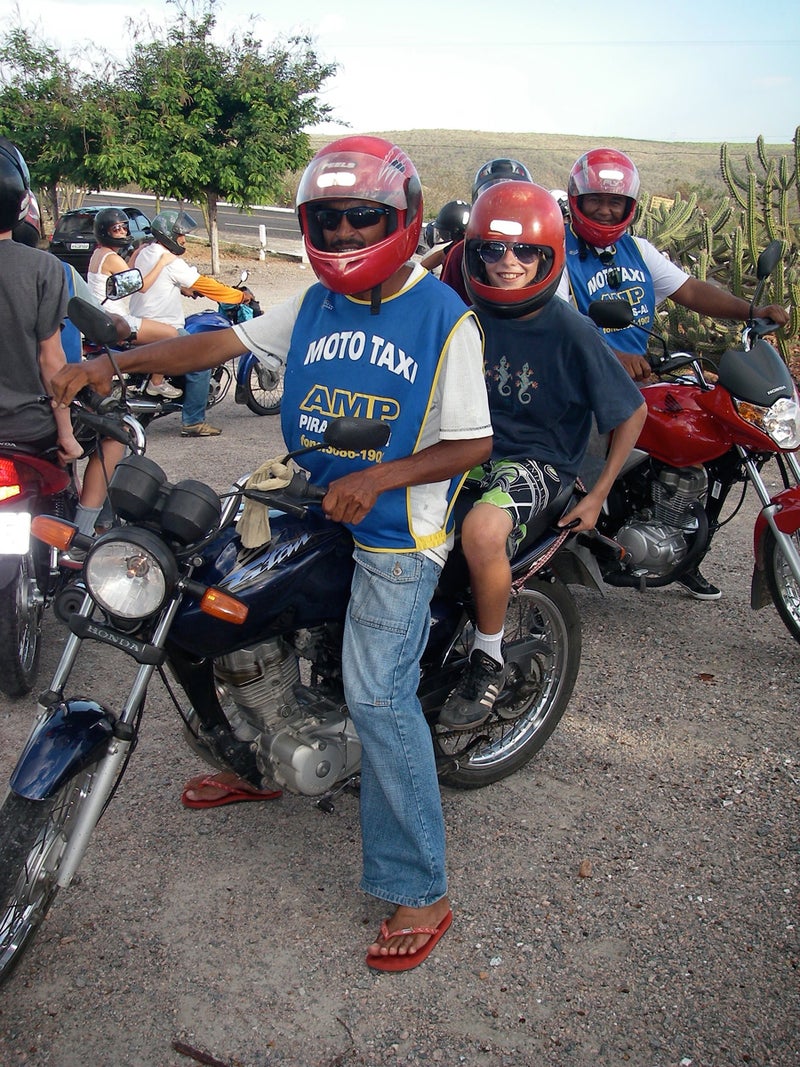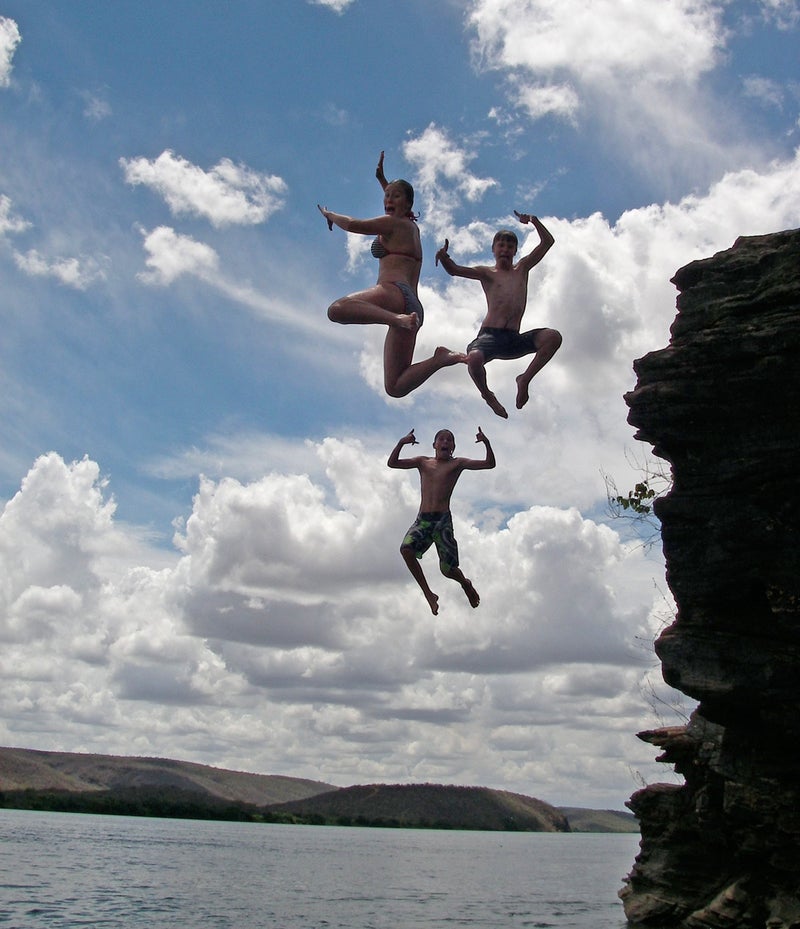“This is why our families work so well together. I don’t know how many moms would be so cool about seeing their kids go off on motorcycles—in Brazil!” exclaimed Martha Newell, my friend from our hometown of Missoula, Montana.
She and her family—husband Mike and sons Carson, 14, and Bowen, 17—had just arrived for a visit to Penedo, the small town in Brazil where we were living for the year. Wanting to treat our guests to something special, we’d waited for their arrival to explore the inland part of our state of Alagoas. Our town of Penedo was near the mouth of the Rio São Francisco, where it empties into the Atlantic amid sand dunes and palm trees. We'd been to those beaches but never upriver.
So, with Martha's family, we set off on a three-day excursion up the Rio São Francisco. In the tropics, you don't need much for clothes. We got away with a daypack each. We caught a van to the bigger town of Arapiraca, then jammed into the back of a pickup truck, the only conveyance available for transport to the smallest towns. An hour and a half later, we spilled out in the riverside town of Piranhas. Picturesque, it's strung like beads up and down a couple of hillsides. This was when my husband, Peter, spontaneously contracted with eight moto-taxis, motorcycles, to take us to view the Xingo Dam.

I’ve often thought an important requirement for good traveling companions is a matching tolerance for risk, discomfort and unpredictability, which may be one reason Peter and I manage so well. We've both spent plenty of nights sacked out on hard ground, sweating through humid, mosquito-ridden nights… and we have both imagined our child stuck in the outback, bitten by a snake, too far from the anti-venom; envisioned the dengue fever, typhoid, cholera, malaria, hepatitis A, B, and C. And together, we redrew our plans accordingly, but went ahead.
This time, Peter, a long-time canoeist, decided it would be fun to float home, downriver from the town of Piranhas to Penedo—100 miles. Few locals seemed to have done it. Before the advent of dams and cars, this once Mississippi-like river had been a main route, thick with sailboats transporting their wares from town to town. Now, it was almost empty, save for occasional fishermen in their canoes. Asking around in Piranhas, Peter found Ugo, a fisherman. A football player of a man with soft brown eyes under thick black brows, Ugo said we should leave at 5:30 in the morning if we wanted to get to Penedo before dark. He showed up at 6:00. We stepped carefully into his motorized, double-wide canoe with its canopy top. There would be nine of us, plus daypacks, squeezed in like peas in a pod. We would be there for the next nine hours, or so Ugo had said. This could be a challenge.
Ugo clearly knew the river, stone by stone. We slid past dry, knuckled hills, river water boiling around us. He steered the green and yellow craft, with its tiny propeller the size of my hand, close into steep-sided sand banks, out into the boiling middle, around copper rocks, sprouting black cormorants; going wherever he needed to make maximum use of the current.
Our 12-year-old son Skyler and Carson promptly stretched out on cushions in the bow to go back to sleep. Our 16-year-old daughter Molly read, and Bowen wove backpack pulls out of strands of plastic. We listened with a mixture of delight and distaste as Ugo imparted local lore. Such as the bit about a black snake who crawls into houses at night and finds the nipples of nursing women to suck out the milk.
“E verdade.” “It’s true.” He nodded seriously. “It happened to my wife’s mother. They killed the snake and when they cut it open it was full of milk.” I shivered.
“Cliffs,” Skyler said, scanning the riverbank a few hours later. “Look at those cliffs. They’re perfect for jumping. Can we stop? Can we?” He pointed eagerly at the sheaves of rock rising above us.

Shortly after, Ugo pulled into a prainha. This little beach was tucked behind a set of rocks, under a tree. I threw my legs over the canoe's side and unexpectedly dropped into water up to my ribs. It turns out the river reaches depths of 90 meters in places. Skyler and Carson clambered out, shedding their shirts. Molly joined them, then Peter, then Mike, all flying off the 15-foot high rocks in ecstatic shapes—tucked, splayed, arched—before splashing into the warm current and drifting down to a landing spot.
When we re-gathered at the canoe, Ugo was whacking at a brown coconut with a large machete. It sounds ridiculous in retrospect, but we'd packed nothing for lunch and had no snacks. We'd broken rule number one for traveling with kids. Amazingly, no one had complained. Ugo drained the water, chipped off the shell, and broke the moist, white meat into pieces, which he handed to us with chunks of rapadura, dark brown, raw cane sugar. He mimed one bite of coconut, one bite of sugar, and gave it the thumbs-up. “A comida dos pescadores.” “The food of fishermen.” It was fabulous—sweet, moist, and crunchy.
This was hour five, theoretically more than halfway.
We’d left the rocks and roiling currents behind. The small wattle and daub farms in their desiccated draws were starting to be replaced by towns. Colorful houses lined the bank like a parade leading to the ubiquitous church with flanking towers. A clutch of boys tossed a volleyball over a line strung above the water.
By hour 10, the rolling land was subsiding and greening meadows swept away to the horizon; weeping green trees replaced scratchy scrub. Black cormorants yielded to white egrets lazily grazing with cattle. This was an hour after our projected arrival, and we wondered if we would really make it home before dark. Peter and Mike examined a map, measuring distances and calculating time passed. It looked unlikely. While our kids continued to be remarkably patient, with nothing but a few pieces of coconut and some brown sugar in their bellies and no dinner on the horizon, it was beginning to feel urgent.
“Maybe we should pull over in Propria, since there’s a bridge there and a road, and take stock of where we are,” I suggested an hour later. It was now five and it gets dark here at six, like the curtain closing on a play. And, as Bowen sensibly pointed out, we had no running lights.
Propria loomed larger, its city lights beginning to sparkle as it got dark. It was by far the biggest town we’d come across, and the first bridge we’d seen in 12 hours. Ugo headed toward shore.
There was a surprise—the Maravilhosa moored at the bank. I’d seen this double-decker, Mississippi-paddle-wheeler-like boat next to the ferry slip in Penedo. The captain, it turned out, was a friend of Ugo's. Before we knew it, Ugo was lifting our backpacks out of the canoe and handing them over to the crew of the larger boat. Told we’d be traveling the rest of the way with them, we obediently filed up the gangplank.
There was no one on board but the crew and their kids. They’d tow Ugo’s canoe behind. Inside they put out rolls and cheese, a thermos of sweet, black coffee, and beer. Our kids ran up to the top deck to watch as we passed under the bridge, then retired below decks to the hammock room to play Uno. The rest of us stayed above, surveying the oily dark river under a full moon.
We slowly zigzagged our way downriver. “How do you know where to go?” I asked the captain.
“Pratica,” he said. Practice? They were steering this huge boat, around shifting sandbars in the dark, from memory?
Peter, Mike, Martha, and I stood at the top rail, faces to the wind, and peered lazily into the dark water and shadows of overhanging trees. I marveled at the fortuitous turn of events and how often this kind of thing happens to us. A month earlier, we’d taken a similar covered canoe to the Foz, the mouth of the Rio São Francisco. There, the canoe had broken down out at the ocean, and it looked like we’d get home long after dark. We’d been saved that time by a high-tech catamaran and invited to join them for a gourmet buffet on deck. It felt like we’d jumped from backwoods Mississippi to the Riviera.
The trip to Penedo took not nine but thirteen hours. We gratefully lumbered down the gangplank and headed for an outdoor restaurant, hungry but pleased by our adventure.
There are lots of ways to travel. My mother prefers advance planning and lots of preparatory reading. My father preferred wandering on whim. There’s something to be said for both. But either way, things inevitably go awry, especially when traveling in the third world. It helps to believe; believe things will turn out all right. I think that not only changes one’s perception of the experience, but maybe what actually happens. Fred, an acquaintance, a Uruguayan professor teaching in the U.S., comes to Brazil to write because he finds there’s more inspiration in the unpredictable. I understand that. There’s something magical in not knowing. We’ve been surprised and delighted by what gets pulled out of the hat.


